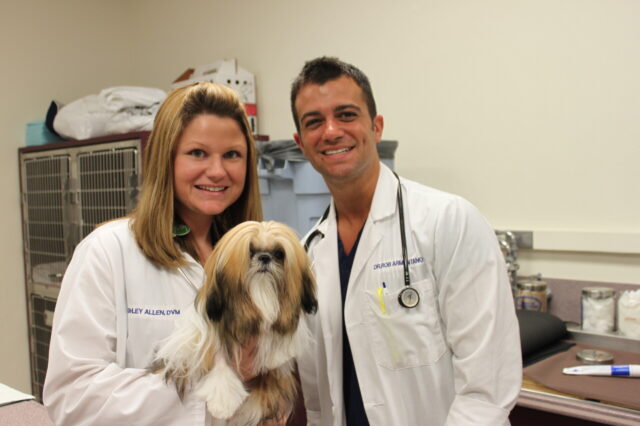UF veterinarians save ‘sponge’ dog, warn pet owners to monitor animals’ chewing behavior

Dr. Ashley Allen and Dr. Robert Armentano, UF small animal medicine veterinarians, are shown with Regal Johnson, a young shih-tsu they helped save after the dog ate sponge-like bedding, which obstructed his airway. (Photo by Sarah Carey)
When Faye Johnson unexpectedly lost her 16-year-old shih tzu, Royal, to a heart attack in February 2009, she grieved deeply. The dog was one of her last ties to her husband, who had passed away eight years earlier. So she sought out Royal’s breeder, and by December, she had Regal: a bright-eyed, silky smooth puppy from Royal’s bloodline that sleeps in the bed with her at night.
But one night Regal was having trouble breathing and woke Johnson up. It became clear he was fighting for his life.
When Regal arrived at the UF Small Animal Hospital on July 31, he was immediately seen by the Emergency and Critical Care Service and placed in an oxygen cage.
“Our initial physical examination showed signs of expiratory respiratory distress, meaning he was having difficulty getting air out of his lungs,” said Ashley Allen, D.V.M., a small animal medicine and surgery intern who worked closely with Regal. “Chest films showed a suspicious object blocking most of his trachea, or main airway, and severe collapse of the trachea in front of the blockage.
Veterinarians also found that Regal’s stomach was filled with fluid and gas, and an ultrasound test revealed the presence of a fibrous-like foreign body in his stomach.
They discussed their options with Johnson, who gave the UF veterinary team the go-ahead to proceed with anesthesia to pass an endoscope down Regal’s trachea and, if possible, his stomach as well.
“With the endoscope, we were able to visualize and remove a foreign object in his trachea,” Allen said. “Since Regal was doing reasonably well under anesthesia, we were also able to remove several foreign bodies from his stomach.”
The foreign bodies were pieces of a sponge-like material, but when veterinarians asked Johnson about their findings, she was stumped.
“I asked Mrs. Johnson to just look around the house while Regal was with us, just to make sure he didn't have anything hidden anywhere,” Allen said.
Johnson did, and her findings surprised everyone: Regal had been eating the stuffing inside of his dog bed.
“He was putting his head under the cover of the bed and eating the sponge,” Johnson said. “There is a huge hole in the sponge. He must have been eating it for weeks.”
She added that the bedding Regal had eaten was not visible unless the cover was completely removed.
After veterinarians removed the sponge material from Regal’s stomach, he remained in the hospital's Intensive Care Unit over the weekend.
Subsequent rechecks have gone well, and Johnson and UF veterinarians say he is doing very well.
“He is back to being a happy, playful puppy,” Allen said. “Mrs. Johnson has disposed of his previous bed and monitors him closely at home.”
Allen added that Regal’s case illustrates that with prompt medical attention, patients with critical needs can have a good outcome.
“Treating these patients successfully often requires a team effort between the multiple clinicians, including the emergency doctor, the radiologist, the internist and the anesthesiologist,” she said. “I think Regal's story also serves as a reminder for owners to provide puppies with toys and bedding that they cannot easily chew up.”
It’s always good to monitor closely any pet playing with a stuffed toy, and to dispose of the toy if the pet starts tearing it up.
“Crate training puppies is also a good idea, so that they don’t get into things while unsupervised,” Allen said. “Puppies are much like toddlers who are just learning to walk. They like to be naughty and get into anything within their reach.”
In Regal’s case, Johnson didn't even know he had been chewing on the bedding, Allen added.
“She is a wonderful owner who loves Regal with all her heart,” Allen said. “Now that she knows he has a habit of eating things, I think she will be making some environmental changes at home to try to prevent this from happening again.”
As for Johnson, she is thankful she was able to get her puppy the help he needed to save his life
“Without the doctors and the excellent equipment at the UF Small Animal Hospital, Regal would have died,” Johnson said. “I barely got him there in time. Every person I have come in contact with at the UF Small Animal Hospital has been extremely pleasant and the quality of care cannot be surpassed.”
For more information about the UF Veterinary Hospitals, visit www.vethospitals.ufl.edu.
About the author
